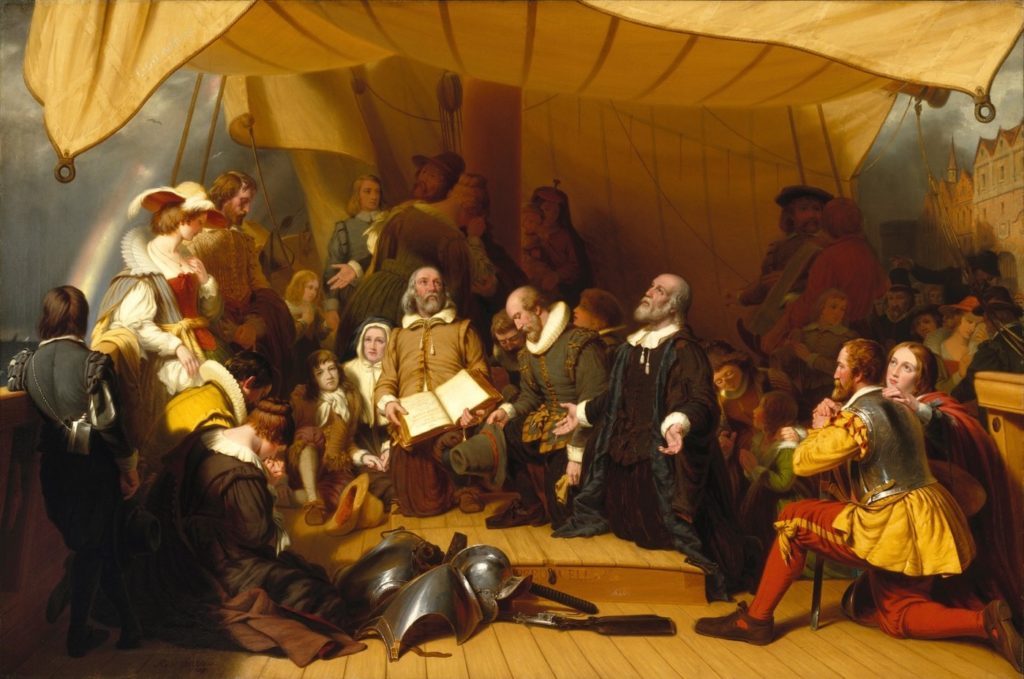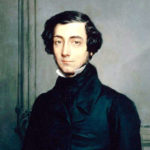Upon hearing the phrase “a City on a Hill,” jaded Americans probably think of their country’s many failed efforts abroad: for example, illegal drone strikes by the U.S. military on Yemeni nationals. Or they may recall Ronald Reagan’s use of the phrase, and perceive a Cold War conceit about American global leadership that perished in the deserts of Iraq and Afghanistan.
These Americans can be forgiven for associating John Winthrop’s immortal line with the most triumphal, progressivist, and imperialist versions of American exceptionalism. But this association is unfair. Winthrop and the American Puritans held a sophisticated and ambivalent view of national exceptionalism, under which a people must observe the conditions of their covenant with God or else see His favor withdrawn. Perhaps as we modern Americans experience a cynical hangover after the giddy confidence of the “unipolar moment,” revisiting the Puritans’ nuanced notion of what it means to be an exceptional people can bring needed perspective, and restrain us from falling for triumphalism or despair.
Since the United States’ founding, Americans have viewed Puritan New England as a prototype of the republic. Observers of American life from Alexis de Tocqueville and John Quincy Adams to Sacvan Bercovitch and David Hackett Fischer have held that studying Puritan institutions, folk-ways, and mores enables us to understand America’s republican culture. Some, however, think that relying on the Puritans as a political model overlooks America’s historic sins, inappropriately theologizes the nation, and prosecutes endless wars on behalf of global democracy and capitalism. Under this reading, there is little daylight between Winthrop’s “city on a hill” and Francis Fukuyama’s “end of history.” Utopianism may have changed from Calvinist Christianity to liberalism, but the same corrosive and dangerous chauvinism burns on.
But this view fails to do justice to the profoundly nuanced vision actually espoused by the Puritans. They nursed audacious hopes, to be sure, but harbored equally profound apprehensions of failure.
Start your day with Public Discourse
Sign up and get our daily essays sent straight to your inbox.Perhaps as we modern Americans experience a cynical hangover after the giddy confidence of the “unipolar moment,” revisiting the Puritans’ nuanced notion of what it means to be an exceptional people can bring needed perspective
Aspirations for Holiness
Of course, I don’t mean to deny that there were utopian aspirations in American Puritan thought. Indeed, this aspect of Puritanism is essential to their thinking. Many of Massachusetts’s leading lights hoped their community could attain unprecedented holiness. Their goal was to hasten the instantiation of Christ’s kingdom on earth, which is prophesied in the apocalyptic book of Revelation. “Where was there ever a place so like unto New Jerusalem as New England hath been?” queried Increase Mather, a prominent minister. “It was once Dr. [Twiss’s] opinion that when New Jerusalem should come down from heaven America would be the seat of it. …”
Disillusioned by the Church of England’s reversion to Catholic errors, the English Puritans underwent voluntary exile into the American wilderness and hoped to find a new Promised Land. This bastion of righteousness, the Puritans thought, would emanate hope for Europe. “New England would become a strong light that would reach over to Old England, the Low Countries, perhaps even the whole Latin world, illuminating their darkness and drawing some away,” writes A. W. Plumstead. Increase Mather’s son, Cotton Mather, invoked imagery from Revelation in asserting New England’s status as an exemplary beacon shining upon the darkness and corruption of the Old World: “[I]t shall be profitable for you to consider the light which from the midst of this outer darkness is now to be darted over unto the other side of the Atlantic Ocean.”
Fear of Wrath
Clearly the Puritans had lofty hopes for their settlement. But what the scholar E. L. Tuveson terms “apocalyptic Whiggism” (by which he means a progressivist expectation that history will inevitably usher in the reign of Anglo-Saxon civilization, along with its ideas about liberty) is far from the whole story. The Puritans consistently spoke of New England as a latter-day Israel. This analogy to God’s chosen nation obviously entailed grand aspirations. But inextricable from their hopes for a special communal relationship with God was an equally intense fear of peculiar divine wrath.
This ambivalence is nowhere more visible than in the “city on a hill” address itself, John Winthrop’s “Model of Christian Charity” (1630). The thesis of this speech, which the future governor of Massachusetts Bay delivered as the settlers embarked from England, is that New England’s special relationship with God is conditional. If the New Englanders commit themselves to corporate righteousness, and to unity through mutual love, then according to Winthrop, “[t]he Lord will be our God, and delight to dwell among us, as his own people, and will command a blessing upon us in all our ways.”
But with the prospect of exalted peaks comes that of low valleys. Winthrop delivered the famous line: “For we must consider that we shall be as a city upon a hill.” What does it fundamentally mean to be a city upon a hill? The next sentence answers: “The eyes of all people are upon us.” In other words, the nations shall watch. As American historian Daniel T. Rodgers puts it, “Imagining that the Puritan colony in New England might actually realize an image of perfection could not be unlinked from the anxiety of terrible failure. … To be as a city on a hill was to live, permanently and inescapably, in the conditional tense.” Having the world as an audience was a privilege that came with a heavy burden. Failure was distinctly possible, and would incur grievous consequences.
When the Puritans claimed the mantle of biblical Israel, they did so knowing that this legacy promised both blessings and curses. Winthrop and other Puritan writers invoked the Calvinist tradition of covenant theology, a framework for scriptural exegesis that emphasizes the Bible’s series of covenants that God has made with his chosen people. If God bestows success on the Massachusetts project, “then hath he ratified this covenant and sealed our Commission, and will expect a strict performance of the articles contained in it; but if we shall neglect the observation of these articles [the Massachusetts Bay Colony Charter] which are the ends we have propounded, … the Lord will surely … be revenged of such a [sinful] people and make us know the price of the breach of such a covenant.”
New England, like Israel, will be judged by a more rigorous standard than the other nations, because of (to use language from Winthrop’s famous address) the “strict and peculiar manner” in which God “hath taken us to be his. …” Israel, having received singular favor in the form of extensive divine revelation and covenantal promises of prosperity, was held to a higher standard than unbelieving peoples. Their failures were more inexcusable given their national privilege. When English Protestants began to conceive of their country as a New Israel, the Puritans applied this logic to their own political project. England enjoyed a relationship with God that the Ottoman Empire, for instance, did not. Its corruptions, therefore, were more noxious in His sight. New England, like England, must hew to a higher standard in light of exceptional blessings.
When the Puritans claimed the mantle of biblical Israel, they did so knowing that this legacy promised both blessings and curses.
Nor does the political covenant operate in the same way as an individual Christian’s tie to the Lord. Calvinist theology asserts that God has unconditionally elected individuals for salvation. He chose them before time began, and no external power or impulse within the individual can cause the revocation of divine grace. Not so for the political community: individual election and national election are not the same. The latter, unlike the former, can be forfeited.
There is a second important distinction between individual salvation and political covenants. The Christian will enjoy the fruits of faithfulness in the next world. But the polity cannot; its rewards (and punishments) are distributed in the present. Covenant-breaking has consequences, and in the case of the political body, those consequences appear in history and in nature. God’s actions are often inscrutable, but in the case of the covenant community, matters become more predictable. By entering a covenant, explains Perry Miller (probably the greatest of all scholars of New England Puritanism), God limits Himself: “Thereafter He can inflict punishment only when the society has deserved rebuke.” Prosperity is divine blessing; calamity is divine displeasure.
The Puritan idea of conditionality did not die with the American founding. The most poignant of many echoes came in Abraham Lincoln’s second inaugural address in 1865. As the Civil War raged, the president declared that God was visiting desolation on the nation for the sin of slavery: “He gives to both North and South this terrible war as the woe due to those by whom the offense came. …” America, the city upon the hill, had betrayed its high commission, and God had predictably responded with judgment. Lincoln, the new watchman, exhorted the nation to see its guilt, humbly submit to divine justice, and labor (and fight) to restore peace.
The Puritans certainly believed that their community was privileged in God’s eyes. But this conviction, informed by the example of biblical Israel, foresaw no inevitable upward climb. New England would be exceptional, but whether for good or ill was not certain. Indeed, it often seems as if the Puritans focused more on their failures than on their successes. The plantation’s conformity to God’s high standard would depend on the people and their virtue, and on the exhortations of wise leaders.
The Puritans certainly believed that their community was privileged in God’s eyes. But this conviction, informed by the example of biblical Israel, foresaw no inevitable upward climb.
Learning from the Puritans
Although in beliefs, political forms, mores, material conditions, and folkways we differ from our Puritan forebears as much as night from day, we still share their propensity for falling from wild hope into desperate lament. Today, left and right both share a feeling that we have gone wrong in profound ways. Failed wars in Iraq and Afghanistan (and within living memory, in Vietnam) have sapped our faith in America’s aptitude for an exceptional role in the world. We’re wrestling with questions of communal guilt and responsibility for the slavery and racism that have marred American history. We stand in a trough of the cycle of hope and despair that has churned throughout American history. Post-revolutionary jubilance and the Era of Good Feelings devolved into bitter conflict over slavery’s extension, and then into the existential anguish of the Civil War. Exultation came at the end of World War II, only to give way to the unrest of the 1960s. When the Cold War ended, giddy triumphalism erupted as many beheld the End of History. That euphoria has soured; today we wallow in Puritan self-doubt.
Instead of oscillating between self-worship and self-hatred, we would seek to be simultaneously proud of our accomplishments and crestfallen at our failures.
If progressivist believers in Manifest Destiny denied the possibility of valleys, perhaps at other times we may lose sight of peaks. Under the Puritan understanding, exultation unmoored from fear spells disaster because it leads to presumption and arrogance. But gloom without hope induces despair—and, indeed, even the Puritans sometimes slid dangerously close to despair. But at their best, their grief over their moral failings sharpened their vision of the good. The Puritans’ political vision was clearest to them when they apprehended its demise.
What would it look like to learn from their paradoxical view of national destiny? Instead of oscillating between self-worship and self-hatred, we would seek to be simultaneously proud of our accomplishments and crestfallen at our failures. In times of national health, prosperity, and power, we would temper our optimism with humility, recognizing that America has no eternal guarantees from God or from the laws of history. And in times of civil turmoil and international rivalry, like today, we would stave off cynicism by recalling the ideals on which this country was founded. Continually recommitting to our own political vision can help us resume our role as a City fit to be emulated by the nations.
A true recovery of the Puritan legacy does not mean being blind to our national shortcomings; nor does it require shrinking from America’s grand aspirational character. To emulate the Puritans means cherishing lofty hopes about America’s promise, tempered by a humble readiness to repent in order that the national covenant between this new Israel and its God may be restored.













